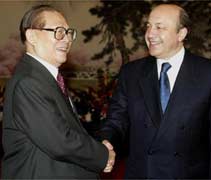|
NKorea Threatens Tougher Counter-Measures
 |
|
North Korea 's 5MW Yongbyon nuclear facility is seen in this March 2, 2002 satellite file photo.
|
PYONGYANG,
February 28 (IslamOnline.net & News Agencies) - North
Korea
threatened "tougher counter-measures" Friday, February 28,
if the U.S. continued to pile on the pressure in their ongoing nuclear
stand-off and denied it was using "brinkmanship" to extort
economic benefits.
The
warning came after U.S. officials said that North Korea had restarted
the reactor at a controversial complex which has been at the centre of
the tense nuclear stand-off on the Korean peninsula, Agence
France-Presse (AFP) said.
The
North's withdrawal from the nuclear Non-Proliferation Treaty in
January was solely for the purpose of self-defense, the official daily
of Pyongyang's ruling Korean Workers Party, Rodong Sinmun, said
"The
United States is painting the DPRK (North
Korea's)
self-defensive counter-measure to cope with its escalating military
threat and pressure on the DPRK as 'brinkmanship tactics' in a bid to
build up public opinion.
"This
only betrays the political imbeciles' ignorance of the reality,"
the paper said.
"The
further the U.S. escalates its military threat and pressure on the
DPRK, the tougher counter-measures it will take to cope with
them," the paper said.
Washington
has accused North
Korea of
reactivating the plant at Yongbyon, north of the capital Pyongyang,
that is capable of producing weapons-grade plutonium.
But
the North has not yet taken the more serious move of reactivating a
plutonium processing plant at the complex, the officials said,
speaking on condition of anonymity.
Meanwhile,
a report in Tokyo Friday said North Korea is believed to have tested a
rocket booster at a Taepodong ballistic missile launch site in its
northeastern province of North Hamgyong in January 2003.
Citing
Japanese and U.S. government sources, Yomiuri Shimbun newspaper
in Tokyo said evidence that a test was conducted at Musundani included
a change in the color of the ground near the launch site, some of
which is covered in the hopes of deterring surveillance.
The
missile test at Musundani proves Pyongyang is pursuing ballistic
missile development, the sources told the daily.
In
August 1998, North Korea test-fired an intermediate range Taepodong 1
missile, which flew over Japan and landed in the Pacific Ocean.
'Verification'
In
a separate related development, South Korean President Roh Moo-Hyun
ordered a team of security advisers to verify reports that North Korea
has fired up a nuclear reactor Friday.
"President
Roh told government agencies related to national security to verify
(the reactivation of the reactor) and prepare counter-measures,"
spokeswoman Song Kyoung-Hee said.
Roh's
statement came after a briefing from national security adviser Ra
Jong-Il, who said South Korea would endeavor to find out the status of
the facility.
The
International Atomic Energy Agency (IAEA) said late Thursday it
deplored the restart of the reactor, saying that if confirmed it would
show disregard for non-proliferation obligations.
The
IAEA said in a statement that without the presence of inspectors, it
was not able to verify whether the reactor had been restarted.
"However,
if this is true, the IAEA deplores the operation of (North Korea's)
nuclear facilities without the presence of safeguards
inspectors," the UN's nuclear watchdog said.
The
complex has been cut off from the outside world since North Korea
expelled international inspectors in December before announcing its
withdrawal from the nuclear Non-Proliferation Treaty in January as a
response to the U.S. cut of fuel move.
More
Troublesome Behavior
In
Washington, White House spokesman Ari Fleischer appeared to downplay
the latest twist in the five-month drama, shrugging off the restart of
the plant as just more "troublesome behavior" to be expected
from the Stalinist state.
 |
|
Russia, China issued a joint communiqué urging direct dialogue between Washington and Pyongyang
|
"This
is something they said they would do," he said. "With each
step that it takes to advance its nuclear capabilities, North Korea
further isolates itself and demonstrates its willingness to flout
accepted norms of behavior."
But
Secretary of State Colin Powell later denied downplaying the stand-off
in the face of criticism that Washington is pre-occupied with Iraq.
"We're
not downplaying it," said Powell, who has just returned from a
tour of northeast Asia dominated by the crisis.
"We
still feel strongly that North Korea is a problem not just for the
United States, it is a problem for the region and a problem for the
world.
"The
region and the world have to be involved in finding a solution, in
being part of that solution.
"And
we can't simply allow North Korea to make threats, present demands
from a position of disobeying the will of the international
community."
“U.S.–NKorea
Dialogue”
Commenting
on the issue, Russian Foreign Minister Igor Ivanov said Friday that
Russia and China are willing to work for a non-nuclear Korean
peninsula but dialogue between the United States and North
Korea is
the key to resolving the problem.
"Russia
and China can push forward conditions for resolving the issue on the
Korean peninsula," Ivanov said through a Chinese translator at a
press conference in Beijing.
"But
the key is direct dialogue between North
Korea and
the United States."
Russia
and China were willing to do whatever it took to facilitate the talks,
he said.
During
his discussions with Chinese leaders on Thursday, the two sides
researched and had wide ranging talks on the issue, Ivanov said.
On
Thursday, Ivanov and his Chinese counterpart Tang Jiaxuan issued a
joint communiqué urging direct dialogue between Washington and
Pyongyang while also underscoring the position of both capitals for a
non-nuclear Korean Peninsula.
"Equal
and constructive dialogue between the United States and the DPRK (North
Korea) on
the nuclear issue of the DPRK will be of great significance to the
normalization of relations between the DPRK and the United
States," the communiqué said.
"Both
China and Russia are ready to actively push for a political resolution
of the nuclear issue of the DPRK in both bilateral and multilateral
arena," it said.
|